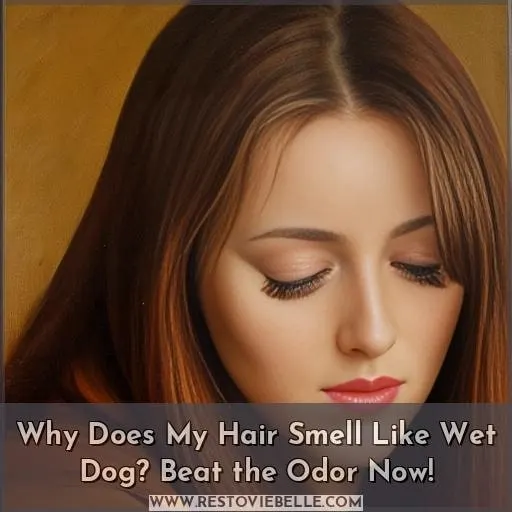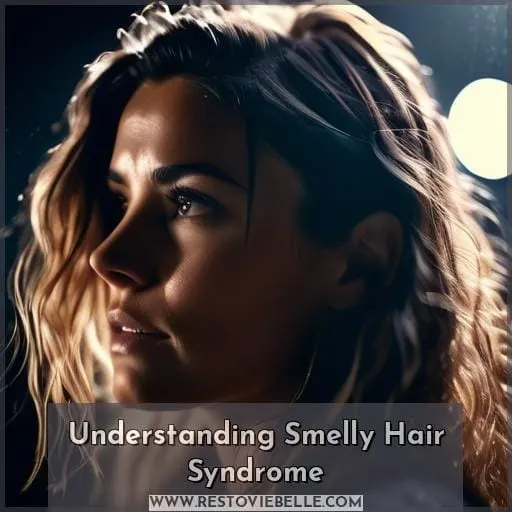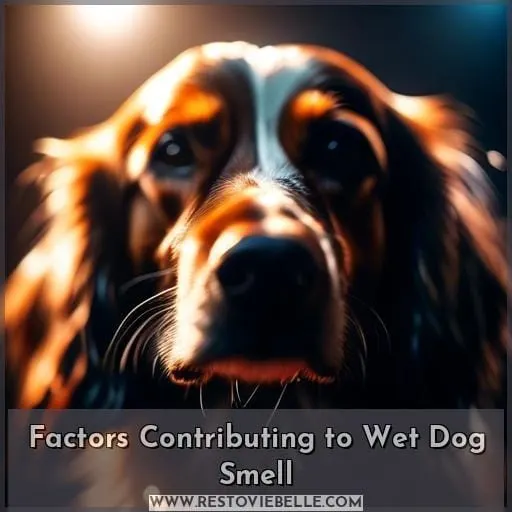This site is supported by our readers. We may earn a commission, at no cost to you, if you purchase through links.
 Struggling with hair that smells like a wet dog, even after a fresh wash? You’re not alone. This unpleasant phenomenon can be attributed to a variety of factors, including the natural oils on your scalp interacting with microorganisms, or the effects of hard water and product buildup.
Struggling with hair that smells like a wet dog, even after a fresh wash? You’re not alone. This unpleasant phenomenon can be attributed to a variety of factors, including the natural oils on your scalp interacting with microorganisms, or the effects of hard water and product buildup.
Understanding the root cause is key to tackling the issue. Whether it’s a case of Smelly Hair Syndrome or an imbalance in your scalp’s microbiome, there are effective home remedies and preventive measures to help you regain a fresh-smelling mane.
Don’t let a smelly scalp dampen your spirits; let’s explore how to beat the odor for good.
Yes, your hair might smell like wet dog due to a combination of factors such as bacteria, sweat, untreated dandruff, or even mold growth from leaving your hair wet for too long. These elements can interact with your scalp’s natural oils and sweat, leading to an unpleasant odor.
Table Of Contents
- Key Takeaways
- Understanding Smelly Hair Syndrome
- Factors Contributing to Wet Dog Smell
- Effective Home Remedies
- Preventive Measures for Healthy Scalp
- When to Consult a Dermatologist
- Frequently Asked Questions (FAQs)
- Can dietary changes help reduce the smell of my hair if it smells like a wet dog?
- How does the pH level of water affect hair odor, and are there any specific water treatments recommended to prevent this smell?
- Are there any specific hair types or textures more prone to developing a wet dog smell, and how can individuals with these hair types address the issue?
- Can stress or emotional factors contribute to the development of a wet dog smell in hair, and if so, how?
- What role do environmental factors, such as pollution or exposure to smoke, play in contributing to hair smelling like a wet dog, and how can these effects be mitigated?
- Conclusion
Key Takeaways
- Excess oil production, bacterial and fungal infections, and product buildup are primary causes of hair smelling like a wet dog.
- Poor ventilation, diet, hormonal imbalances, and the use of hot water for hair washing can exacerbate the issue.
- Effective home remedies include using Neutrogena T/Gel Shampoo, apple cider vinegar, baking soda, tea tree oil, and lemon juice to combat the odor.
- Preventive measures such as washing hair with lukewarm water, avoiding harsh chemicals, and consulting a dermatologist for persistent issues are crucial for maintaining a healthy scalp.
Understanding Smelly Hair Syndrome
If you’ve ever noticed your hair smelling like a wet dog, especially after it gets wet, you’re not alone.
The causes range from a buildup of natural oils and microorganisms on your scalp to conditions like dandruff and seborrheic dermatitis.
This issue can be both puzzling and embarrassing, but understanding the underlying causes can help in finding effective solutions to combat the problem.
Causes of Smelly Scalp
Ever wondered why your head’s throwing off a wet dog vibe? It’s not just you; it’s a smelly scalp party, and unfortunately, you’re the host.
- Humidity and sweat turn your scalp into a tropical paradise for unwanted guests.
- Hormonal imbalance cranks up the oil production, inviting bacteria and fungus to feast.
- Dandruff is like confetti at this party, flaking everywhere.
- Bacterial or fungal infections are the uninvited plus-ones, making matters worse.
Symptoms of Smelly Hair Syndrome
If you’re scratching your head over the stink situation up top, you’re not alone. Smelly Hair Syndrome is like an uninvited guest at a dinner party—it’s uncomfortable, a tad embarrassing, and you’re not quite sure how to address it.
| Itchy Scalp | Dandruff | Redness |
|---|---|---|
| A tell-tale sign that your scalp’s throwing a fit. | Those flaky little party crashers that just won’t leave. | The scalp’s way of blushing from all the unwanted attention. |
These symptoms are the scalp’s SOS signals, hinting at possible fungal infections or seborrheic dermatitis. If your head’s itchier than a stand-up comic’s first gig, flakier than a pie crust, and redder than a lobster in the sun, it’s time to take action.
These scalp issues can lead to a hair odor that’s less ‘freshly washed’ and more ‘wet dog on a rainy day’. Remember, if your scalp’s acting up more than a drama club, and home remedies have you playing whack-a-mole with symptoms, it might be time to call in the pros—a dermatologist can help you curtain call this smelly hair syndrome.
Factors Contributing to Wet Dog Smell
When you notice your hair smells like a wet dog, it’s crucial to understand the underlying factors contributing to this unpleasant odor.
The primary culprits include the natural oils and microorganisms on your scalp, which can interact with environmental factors like humidity and hard water, leading to that distinctive smell.
Additionally, conditions such as mildew growth due to trapped moisture in thick hair or the effects of hard water on your scalp can exacerbate the issue.
By recognizing these factors, you’re taking the first step towards addressing and ultimately eliminating the wet dog smell from your hair.
Role of Natural Oils and Microorganisms
Your scalp is like a bustling city for tiny inhabitants, natural oils, and microorganisms. When they’re in harmony, everything’s peachy. But throw in some extra sweat or a dash of seborrheic dermatitis, and you’ve got a recipe for that ‘wet dog’ aroma.
It’s all about the microbiome balance and keeping those scalp pH levels just right. Too much bacterial overgrowth or a yeast party, and you’re in for some scalp inflammation.
Let’s not forget, those natural oils are like an all-you-can-eat buffet for these critters. If things get out of whack, you might need antifungal medications to crash the party and restore order.
Impact of Hard Water and Mildew
Continuing from the role of natural oils and microorganisms in creating that dreaded ‘wet dog’ smell, let’s dive into the impact of hard water and mildew. You see, your hair’s texture and moisture retention can be significantly affected by these sneaky culprits.
- Mildew Growth: Thick hair can trap moisture, creating a petri dish for mildew, which parties hard, leaving behind a musty souvenir.
- Mineral Deposits: Hard water acts like an uninvited guest, leaving minerals on your hair that can lead to a lingering, unwelcome odor.
- Moisture Retention: Hair texture plays a role; the denser it is, the more likely you’re to host a mildew fiesta.
- Odor Elimination: A clarifying shampoo can be your knight in shining armor, banishing unwanted mineral deposits and mildew to the land of ‘No More.
Effective Home Remedies
If you’re struggling with hair that smells like a wet dog, you’re not alone, and there are effective home remedies that can help.
Neutrogena T/Gel Shampoo, with its active ingredient coal tar, is designed to treat conditions like dandruff and seborrheic dermatitis, which can contribute to scalp odors.
Additionally, natural solutions such as apple cider vinegar and baking soda can balance your scalp’s pH and combat odor-causing bacteria. These remedies, when used correctly, can restore your hair’s freshness and eliminate that unwelcome wet dog smell.
Neutrogena T/Gel Shampoo and Conditioner
When you’re wrestling with the wet dog smell in your hair, it’s time to bring out the big guns: Neutrogena T/Gel Shampoo and Conditioner. These aren’t your average hair care products; they’re like the superhero duo of the scalp world.
T/Gel’s ingredients pack a punch against dandruff and seborrheic dermatitis, with coal tar and salicylic acid leading the charge.
| Ingredient | Purpose | Considerations |
|---|---|---|
| Coal Tar | Tackles dandruff and scalp psoriasis | May discolor light hair |
| Salicylic Acid | Helps shed scaly skin | Can be drying; use conditioner |
| Sodium Chloride | Thickens the shampoo | Generally safe |
| Fragrance | Makes the product smell nice | Can irritate sensitive skin |
| Cocamidopropyl Betaine | Cleanses and stabilizes foam | Mild and biodegradable |
T/Gel’s effectiveness isn’t just hearsay; it’s backed by those who’ve seen their scalp irritation and flakiness take a hike. However, keep an eye out for t/gel side effects like skin irritation, and if you’re not keen on coal tar, t/gel alternatives like hair masks might be your jam.
As for t/gel availability, it’s as easy to find as a dog chasing its tail—just pop into your local pharmacy or check online. Remember, if your scalp’s still throwing a fit after a few washes, it might be time to see a dermatologist.
Apple Cider Vinegar and Baking Soda Solutions
Apple cider vinegar (ACV) and baking soda are touted as grand slams in the natural hair care league. ACV, with its acetic acid, is a home-run hitter for balancing hair and scalp pH, while its antimicrobial properties knock out scalp infections, leaving your mane in the major leagues of luster.
But don’t let baking soda play too long in your hair care game; it’s got a high pH that can cause frizz and breakage if it becomes a regular in your lineup. So, while ACV might be your MVP for a shiny, healthy scalp, remember that baking soda is best kept as a pinch hitter for occasional deep cleans.
Preventive Measures for Healthy Scalp
To combat the unpleasant wet dog smell from your hair, it’s crucial to maintain a healthy scalp through regular washing and the use of gentle hair care products.
Washing your hair with lukewarm water and a sulfate-free shampoo can help prevent the accumulation of oils and microorganisms that contribute to the odor.
Additionally, avoiding harsh chemicals and heating devices protects your scalp’s natural balance, reducing the risk of irritation and odor.
Importance of Regular Washing
Washing your hair is like hitting the refresh button for your scalp, but it’s not just about keeping it clean. It’s a delicate dance with water temperature, hair type, and the products you use.
- Water temperature is a Goldilocks game; too hot and you risk irritation, too cool and you mightn’t cut through the grime. Aim for just above body temp.
- Hair type dictates your shower frequency. Thick, curly locks can often go longer between washes, while fine, straight hair may need more love.
- Hair products should be your hair’s best friends, not frenemies. Choose wisely to avoid buildup that can lead to scalp sensitivity.
Avoiding Harmful Chemicals and Heating Devices
Continuing from the importance of regular washing, let’s dive into why you should also be wary of harmful chemicals and heating devices. You know the drill: you’re styling your hair, and it’s looking hot, but not in the way you want—more like a fried strands kind of hot.
That’s your cue to ease up on the heat styling. And while you’re at it, let’s talk about those sneaky chemicals in your hair products. Sulfates and parabens might be the usual suspects, but have you heard about anticholinergic drugs and calcineurin inhibitors? They could be throwing your scalp’s balance out of whack, leading to that why does my hair smell like wet dog moment.
Limiting hair products with harsh chemicals and reducing heat styling can help maintain your scalp’s health and prevent hormonal imbalances. So, next time you reach for that straightener or curling iron, remember: your hair’s health is worth more than a temporary style.
When to Consult a Dermatologist
If your hair persistently smells like a wet dog, especially after trying various home remedies, it’s time to consult a dermatologist.
This odor could be a sign of underlying conditions such as fungal infections or seborrheic dermatitis, which require professional diagnosis and treatment.
A dermatologist can offer targeted solutions like medicated shampoos or treatments that address the root cause of the smell, ensuring your scalp health is restored and the odor is eliminated.
Persistent Odor and Severe Symptoms
If your hair’s still throwing off that wet dog vibe after trying every trick in the book, it’s time to call in the pros.
- You’ve been battling the stink for over a week.
- Your scalp’s itchier than a wool sweater.
- Flakes are falling more than winter snow.
- Your head’s sore or puffier than a blowfish.
- Hair’s bailing on your scalp like a sinking ship.
Identifying Underlying Medical Conditions
If your noggin’s still kicking up a stink after trying every trick in the book, it’s time to play detective and rule out the usual suspects: dandruff, seborrheic dermatitis, and those pesky fungal and bacterial infections.
Don’t just grin and bear it; a dermatologist can sniff out the issue, ensuring your scalp’s health isn’t going to the dogs.
Frequently Asked Questions (FAQs)
Can dietary changes help reduce the smell of my hair if it smells like a wet dog?
Dietary changes can indeed help reduce hair odor. Cutting back on oily and sugary foods may decrease sebum production, lessening that wet dog smell.
How does the pH level of water affect hair odor, and are there any specific water treatments recommended to prevent this smell?
Water with a high pH can turn your hair’s day into a bad hair day, making it smell like a wet dog.
Hard water, rich in minerals, disrupts your hair’s natural pH balance, leading to odor.
To combat this, consider installing a water softener or using a chelating shampoo to remove mineral buildup and restore harmony to your hair’s ecosystem.
Are there any specific hair types or textures more prone to developing a wet dog smell, and how can individuals with these hair types address the issue?
Thick, curly hair can trap moisture, making it a breeding ground for that ‘wet dog’ smell.
To combat this, dry your hair thoroughly and consider using a clarifying shampoo to remove buildup.
Can stress or emotional factors contribute to the development of a wet dog smell in hair, and if so, how?
While it’s a stretch to say stress directly causes your hair to smell like a wet dog, stress can indeed affect your scalp and hair health.
When you’re stressed, your body’s chemistry changes, including the production of sweat and oils on your scalp. These changes can create a breeding ground for bacteria and fungi, leading to an unpleasant odor.
Plus, if stress leads to scratching or neglecting hair care, the situation only gets smellier. So, while stress mightn’t be whipping up that wet dog aroma directly, it’s certainly stirring the pot.
Keep calm and carry on with good scalp hygiene to keep the odors at bay.
What role do environmental factors, such as pollution or exposure to smoke, play in contributing to hair smelling like a wet dog, and how can these effects be mitigated?
Environmental factors like pollution and smoke can cling to your hair, turning you into a walking air freshener for all the wrong scents.
To dodge the wet dog aroma, think of your hair as a sponge soaking up the world’s less pleasant perfumes. Rinse it out regularly with a gentle shampoo, and maybe give those smoggy shortcuts a miss.
Your nose (and everyone else’s) will thank you!
Conclusion
Navigating through the murky waters of a smelly scalp can be daunting, but with the right knowledge and tools, you can emerge with a fresh, fragrant mane.
From natural remedies to preventive measures, you’re now equipped to tackle the issue head-on.
Don’t let a smelly scalp hold you back; fresh, vibrant hair is within reach.











